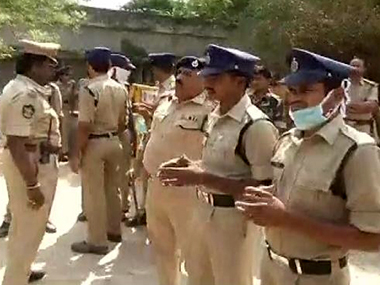On 24 June, Chennai woke up to a horrific daylight hacking of young Swathi, an IT professional, in the Nungambakkam railway station in the heart of the city. The middle class was jolted — if this could happen to Swathi, it could happen to any of their own daughters. The media went into a frenzy over the case and with the Tamil Nadu police remaining tight-lipped about investigations, conspiracy theories abounded — from professional hitmen ‘taking her out’ to a love affair gone wrong to a psychopathic stalker who did her in.
On 1 July, a lone young man was arrested from his home in rural Tirunelveli — Ramkumar, an engineering student who is yet to finish his arrears, made a dramatic suicide bid as police swooped in on him in the dead of night. He is currently undergoing treatment at the hospital inside Puzhal prison in Chennai.
“Law and order in Tamil Nadu has deteriorated and the common man is unsafe,” cried G Ramakrishnan, state secretary of the Communist Party of India (Marxist), late in June. Leader of the Opposition in the state assembly, MK Stalin of the Dravida Munnetra Kazhagam (DMK), launched an attack on the ruling All India Anna Dravida Munnetra Kazhagam (AIADMK) government. “Immediately after the AIADMK assumed charge for the second term, the number of murders in Chennai has shot up,” he charged, alleging that Chennai had become a ‘killer city’.
Experts though point out that a murder like Swathi’s — which now appears to have been fuelled by an obsessive stalker’s rage — is not indicative of the general law and order situation in the state. Such crimes, as well as crimes of passion, can neither be prevented effectively, nor do they speak of the general prevalent trend. So to cite Swathi as an instance of deteriorating law and order situation, is erroneous, they say.
“This particular case (Swathi’s murder) — I don’t think this is a breakdown of law and order, because the girl was being stalked and the family did not appear to have informed the police about the stalking,” said D Mukherjee, former Director General Police of Tamil Nadu. “If the police had been informed, then the responsibility rests with them, but these types of crimes are difficult to prevent,” he said.
What is more worrying though, is the sudden spate of murders for gain, gang wars and related hackings, as well as kidnappings for ransom. These, according to law enforcement experts, hold up a true mirror to society.
“Murders for gain, crimes involving organised crime, robberies and random attacks on women in public — these are the indices of lack of law and order,” added Mukherjee.
‘Tyranny Of Data’
The statistics reveal a picture of a stable society, as far as violent crimes are concerned, according to data available with the National Crimes Records Bureau (NCRB). Tamil Nadu’s incidence of violent crimes from 2009 to 2014 (see graphic) has remained steady, increasing or decreasing marginally, in tune with all India trends. Data available with the Chennai City Police too shows the number of murders for gain as remaining steady since 2013.
But there have been a rash of daring hackings in May and June — at least 12, going by news reports — gang wars in North Chennai as also deep down south in Tuticorin and Tirunelveli. A report submitted by the state police in the Chennai High Court in June also paints an alarming picture of close to 15,000 children gone missing between 2011 to 2015, of which over 2,500 are from Chennai alone. At least four murders for gain have taken place in Chennai alone until June, one of which was a double murder, the victims, almost always vulnerable women. News reports indicate more than double that number if the rest of the state is taken into account until June.
Top officers in the state insist that law and order is under control. But the Third Tamil Nadu State Police Commission Report way back in 2007, the most recent such Commission to be set up, shines a light on things to come.
Comparing data of various crimes over the past 52 years — from 1953 to 2005 — the Commission observes that the population in this period has tripled, and along with that, murders, riots, kidnaps and IPC (Indian Penal Code) cases too have tripled. Robberies have doubled but burglaries have almost halved, while thefts have remained almost static in this period. “It may be seen that burglary and theft kept pace with murder, abduction and IPC crimes till the mid-1970s and then started declining dramatically. Obviously this cannot be the true picture — something is wrong with the statistics,” observed the report, terming this anomaly as a ‘tyranny of data’.
The report goes on to detail what exactly is wrong with the data — a phenomenon described as ‘burking’ — meaning to suppress quietly or indirectly. The reasons for this ‘burking’ of statistics related to property crime, according to the report are “fear of presenting an unflattering view of police performance” and “fear of unmanageable workload if every property crime is registered.”
“It goes without saying that free registration is extremely important,” said D Mukherjee, former DGP of Tamil Nadu. “It has been a problem for many years. Down the line, all police chiefs have tried to encourage free registration of crimes. It is our duty to register crimes freely. But for various reasons, this does not happen. There is a tendency to minimise the category of ‘grave crimes’ by under-quoting value of properties stolen. When grave crimes are reported, senior police officers get involved and junior officers are scared of this, so under-registration and under-quoting happens. These drawbacks still continue but police administration as such, right from the beginning, has been stressing on free registration of crimes,” he explained.
This 2007 report goes on to issue an ominous warning to the state government — crimes are set to rise in the near future. ““With increasing levels of prosperity, India has to gear up to face such a situation,” stated the most recent State Police Commission, the third such Commission to be set up, in its 2007 report. “The boom on account of IT industry has resulted in the youth getting used to a higher standard of living and any disruption in growth could augur an increase in crime. If the police do not take note of the actual level of crime and be prepared to handle it professionally, the society may be in for a shock,” it warned.
“Crime cannot be wiped out in entirety,” said a retired police officer who did not wish to be named. “But the police needs to gear up to face more pressures in the future. Setting up a DNA database of criminals, encouraging crimes to be registered freely without trying to hide statistics and a special legislation to deal with organised crime, along the lines of Maharashtra’s MCOCA (Maharashtra Control of Organised Crime Act) are urgently required,” he said.
A strong case for a DNA database as an aid to crime detection is also made out by the National DNA Database report of 2014-15 of the United Kingdom. According to this, close to six lakh cases have been detected using DNA analysis between April 2001 to March 2015. Two out of three cases get detected when DNA matching is done, according to this report. DNA samples of missing persons too aid in detection, a dire need for the Tamil Nadu police, facing flak from the judiciary and the public on this issue.


)




)
)
)
)
)
)